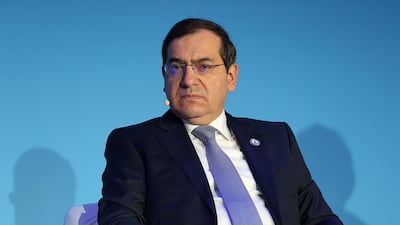Egypt will nearly double its liquefied natural gas export capacity to 2 billion cubic feet per day by the end of 2019, and also plans to collaborate with Saudi Arabia in exploring hydrocarbon reserves in the Red Sea.
"What we are exporting currently as of today is 1.1 bcf per day and we expect that by the end of the year this figure will go up to 2 bcf per day, and this is when we resume the operation of the Damietta plant. The second plant is expected to operate within this year," Tarek El Molla, Egypt's Petroleum and Mineral Resources Minister told The National on the sidelines of the World Economic Forum in Jordan.
Egypt, the Arab world's biggest country by population, has seen economic revival on the back of massive discoveries offshore the Eastern Mediterranean. The finds led by the giant Zohr gasfield, which was discovered by Italian energy company Eni in 2016, have turned Egypt's fortunes from being an importer to a net exporter of gas. The country ended all of its LNG imports last year and has talked about developing a regional gas hub.
The North African country state has since begun reviving its liquefaction plants, with the one at Idku exporting 800 million cubic feet of LNG in February, more than double the volumes it exported from the facility in 2018. Egypt has since invited the likes of Exxon Mobil and Shell after one of its largest concession rounds, which witnessed healthy appetite from international majors for onshore and offshore exploration blocks.
The country will also tap into unconventional resources in the Red Sea and has tendered 10 offshore blocks in its latest bid round announced last month.
Egypt, which has invited companies to explore along the Eastern Mediterranean, Nile Delta as well as along its western deserts, will look to collaborate with Saudi Arabia in exploring the Red Sea, which straddles both countries.
"Yes definitely, we started already to talk with them in order to start having arrangements in place, that we can exchange data, what would be the potential discoveries stranded in the Red Sea,” said Mr El Molla.
Saudi Arabia announced in March it had discovered large quantities of gas in the Red Sea. The kingdom will conduct an investment feasibility study on the scheme and intensify exploration over the next two years, according to Saudi Energy Minister Khalid Al Falih.
Egypt expects production from its Zohr resource increase to more than 3 bcf day this year. The country will also ramp up output from the North Alexandria West Nile Delta concessions operated by BP this month. Production is expected to reach 700 mcf per day with the coming on stream of 400 mcf per day, he said.
Egypt, which has ambitions of becoming a gas hub in the Eastern Mediterranean will look to raise capacity on its LNG plants at Idku, Damietta and Ain Sokhna.
"We can expect the full capacity of Idku in two months’ time, and other facilities in a year’s time maximum,” said Mr El Molla.
Ain Sokha, which was as a reclassification plant receiving LNG to be fed into the electricity grid when Egypt had been an importer, will continue to be in operation for "strategic" reasons said the minister.
"Now the reclassification plant which is the FSRU [floating storage regasification unit], which is standing at Sokhna is going to be there for strategic reasons but on idle mode,” said Mr El Molla.
Egypt, which has an import agreement for gas with Israel – a country with which it shares a peace treaty – expects the fuel to flow by mid-year.
"We are working on the due diligence. They have some technical due diligence for the pipeline itself as well as some formalities in the arrangement of the agreement. Other than that, we expect this gas to start flowing from Israel to Egypt by mid-year. This is what’s planned. We believe this will happen still,” said Mr El Molla.

